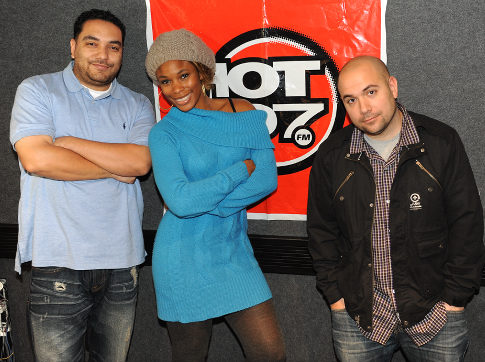Unlike almost every other morning show in radio, Cipha Sounds and Rosenberg of WQHT (97.1 FM, Hot-97) slipped in quietly.
And it worked.
Joined by K. Foxx and billed as “A Black, a Puerto Rican and a Jew,” they have crept ahead of perennial leader WHTZ (100.3 FM) in their target audience of 18- to 34-year-olds.
“It’s turned out better than we thought it would,” says Cipha.
The show has the standard morning mix of music, comedy, gossip, show biz and conversation, but like all good shows, they stamp it their way.
“We don’t just do ‘urban’ topics,” says Cipha. “But if there’s a story that involves the N-word, say, we’ll do it differently from everyone else because of who we are.”
At the same time, part of Cipha’s own role is to sometimes ask if there’s really any story at all. “If someone says ‘Real Housewives’ or ‘Jersey Shore,'” he says, “I’m the guy who goes, ‘Uhhhh, why?'”
Meanwhile, Rosenberg plays the white guy in a culture whose artists remain predominantly black.
“Other programmers always told me not to talk about being white,” he says. “But that was part of [Hot-97 program director] Ebro’s whole concept here.”
That also makes sense in terms of the audience. “At this point, hip hop has really become just youth culture,” Peter Rosenberg says. “Even when I was growing up in the ’90s, my friends all listened to hip hop. Wu-Tang Clan was more my music than Pearl Jam.”
Cipha says the music grabbed him, too.
“I always saw myself becoming a mixer,” he says. “My goal was someday to take over Funkmaster Flex‘s show. But I needed a new angle once I realized he wasn’t going anywhere.”
It was Ebro Darden who put Cipha and Rosenberg together, breaking them in gradually while Hot still carried the syndicated Big Boy morning show.
Eventually, they took over the whole show. “They wanted to go local,” says Rosenberg. “Big Boy is awesome, but there’s just so much happening in New York.”
Both Cipha and Rosenberg say the soft launch served them well.
“We learned how to do morning radio,” says Rosenberg. “We’d have a bit I was sure needed five minutes and we’d do it in two. And make it funnier.”
“We learned from our mistakes,” says Cipha – including, in his case, a suspension in December for some unfortunate remarks about Haitian women and AIDS.
“I learned a lot about how the system works,” he says. “At first, people were angry who didn’t even know what I’d said. But what I did say was bad enough, and I think the most important thing was that I immediately apologized – and meant it.”
For all of hip-hop’s edgy reputation, says Rosenberg, “There’s more controversy today in almost every other part of the culture. Look at Charlie Sheen or Lindsay Lohan. That’s way beyond anything happening in hip hop.”
BY DAVID HINCKLEY
DAILY NEWS




